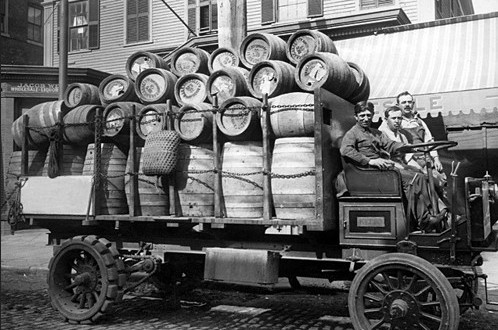I can’t recall a time where there have been more breweries, microbreweries, or varieties. There is even, for the first time in history, such a thing as a beer snob.
We’ve all run into that guy – the one who asks you what your favorite beers are, and then promptly tells you why you are wrong for choosing that beer. He will then proceed to tell you what your favorite beers are based on genetic profiles of hops, obscure strains of barley, and the alignment of specific astral bodies and planets. While you sit there stunned by his obnoxiousness, he’ll finish with a “You’re welcome.”

The Smith Brothers started brewing beer, ale and stouts at 22 William Street in 1880. (Spinner Publications)
I don’t know a heck of a lot about beers, I’m an oenophile – a fancy word for a wino. Whenever I am confronted by a beer snob, I tell them “That’s all fine and dandy, but that’s my favorite beer because I like the way it tastes. Planetary alignment be damned.” It’s the same advice I give to people who ask me about wines. Let your tongue lead the way, not fancy formulas, company backgrounds or unneeded facts. What tastes good to you? Try a bunch – it’s fun.
Anyhow, there was a much simpler time in New Bedford’s history. A time when there were only a few breweries locally, and only a small number of varieties to choose from. Since Dawson’s is the most well-known, I thought I’d highlight New Bedford’s second best-known brewery: the Smith Brothers Inc.
Smith Brother’s Brewery has quite a long history in the city. Brothers James T. and Joseph F. Smith started offering ale, whiskey, and beer in 1880 from a small storefront at 22 William Street – where Arthur Moniz’s Gallery is today. They quickly outgrew this spot and moved the entire operation to 777 Purchase Street (near Family Dollar) in the late 1890s making locals pretty darn happy. They were said to specialize and produce superior stouts, bocks, porters, and ales.
That is until World War I rolled around. On December 18, 1917, the U.S. Senate proposed an 18th Amendment which would prohibit the production, sale, transport or purchase of alcoholic beverages. Almost a year later, on November 18, 1918, U.S. Congress would pass the temporary Wartime Prohibition Act to save grain for the war effort. This would ban the sale of any alcoholic beverage that had an alcohol content greater than 2.75% – pretty much everything. It would take full effect on June 30, 1919 and next day would be known as the “Thirsty-First”.
Things would begin to get quite serious when on January 16, 1919, the 18th amendment was ratified as a part of the Constitution. By October, the government would enact the Volstead Act which would carry out the intent of this amendment, but allowed exceptions for manufacturers, specific industries, scientific research, or…ahem religious rituals. I guess, the government wouldn’t have bought that someone was a Beer-ist and practiced Beer-ism.

The third location for Smith Brothers Inc. Brewery at 425 Coggeshall Street was razed by fire in 1961. (Spinner Publication)
Sometime in this period between 1918-1920 – likely 1918, the Smith Brothers ceased operations. It isn’t clear whether they continued to manufacture beer for industrial, scientific and religious use or not. I couldn’t imagine there would be enough profits in that to keep a facility open.
Things go dark on the Smith Brothers until they are issued U-Permit No. MA-U-113 allowing the resumption of their brewing operations 1933 at 425 Coggeshall Street right next to the railroad tracks in a spot in between the JM of New Bedford Insulation and Metro Industrial & Marine Supply buildings are today.
In this first year, they had a number of labels: Smith Bros. Stout (1933-1937), Smith Bros. Light Dinner Ale (1933-1950), Smith Bros. Stock Ale (1933-1950), and Smith Bros. Pale Ale (1933-1950). In 1937 they added two more labels: Belmont Beer (1937-1943) and Elco Beer (1937-1943). Finally, three more in 1938: Smith’s Ale (1938-1942), Smith’s Bock (1938-1942), and Smith’s Porter (1938-1942).
The Smith Brothers would cruise along turning a profit until the late 1940s when things began to slow down with the advent of World War II. The specifics are uncertain, but they did survive the war but limped along until they closed their doors for good in 1950. In 1961, a fire destroyed the facility and any physical record of its existence was erased from the city.
Of course, beer trays, labels, bottles, and other memorabilia can be found on auction sites, yard sales, and Craigslist. If you are interested in buying some memorabilia and have had no luck with these, there is an excellent beer site that offers memorabilia from every beer that has existed, including the Smith Brothers. You can see that site here.
[nggallery id=314] New Bedford Guide Your Guide to New Bedford and South Coast, MA
New Bedford Guide Your Guide to New Bedford and South Coast, MA









I know I’ve seen that beer truck picture before.
http://www.imcdb.org/i158518.jpg
I bought a 797 button top bottle about 50 years ago. I think I paid $3.30 (.30 was the buyer’s premium).